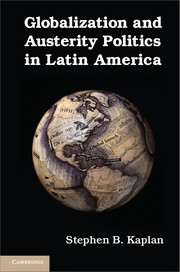Book contents
- Frontmatter
- Contents
- List of Figures
- List of Tables
- Acknowledgments
- 1 Introduction
- 2 Globalization and Austerity Politics
- 3 The Political Economy of Elections
- 4 The Electoral Boom-Bust Cycle
- 5 From Gunboat to Trading-Floor Diplomacy
- 6 When Latin American Grasshoppers Become Ants
- 7 The Political Austerity Cycle
- 8 Conclusion
- Appendix: Field Research Interviews
- Bibliography
- Index
- Other Books in the Series (continued from page iii)
3 - The Political Economy of Elections
Published online by Cambridge University Press: 05 February 2013
- Frontmatter
- Contents
- List of Figures
- List of Tables
- Acknowledgments
- 1 Introduction
- 2 Globalization and Austerity Politics
- 3 The Political Economy of Elections
- 4 The Electoral Boom-Bust Cycle
- 5 From Gunboat to Trading-Floor Diplomacy
- 6 When Latin American Grasshoppers Become Ants
- 7 The Political Austerity Cycle
- 8 Conclusion
- Appendix: Field Research Interviews
- Bibliography
- Index
- Other Books in the Series (continued from page iii)
Summary
When my grandchildren ask me: ‘Daddy, what did you do for the New Frontier?,’ I shall sadly reply: ‘I kept telling them down at the office, in December, January, and April that what this country needs is an across the board rise in disposable income to lower the level of unemployment, speed up the recovery and the return to healthy growth, promote capital formation and the general welfare, insure domestic tranquility and the triumph of the democratic party at the polls.’
– Paul Samuelson, economic adviser to President Kennedy.More than thirty years ago, political scientist Edward Tufte and economist William Nordhaus of Yale University put forth a seminal new theory, known as the political business cycle. While a business cycle typically refers to the economy's regular booms and busts, their central insight was that politics also influences the business cycle. In line with Paul Samuelson's blunt quip to President Kennedy about the economy, they expected incumbent presidents to maximize the economy's growth performance in the prelude to new elections today, even at the cost of an economic bust tomorrow.
In mapping out his research design, Tufte employs the metaphor of a detective solving a murder mystery. After establishing a motive of inflating the economy before elections, he searches for clues (such as changes in economic policy and outcomes) that prove his suspicions that there is a political business cycle. Tufte's study of developed country politics finds electoral cycles in fiscal transfers, growth, and unemployment.
- Type
- Chapter
- Information
- Globalization and Austerity Politics in Latin America , pp. 72 - 122Publisher: Cambridge University PressPrint publication year: 2013



